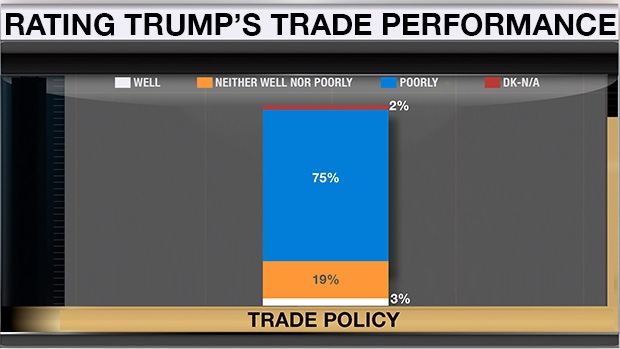Jun 26, 2017
Canadian execs slam Trump on trade, 24% say softwood dispute should be top priority
, BNN Bloomberg
Just seven months after Donald Trump stepped into power, Canadian executives have become increasingly worried about how his leadership will impact the country, with trade being a top concern, according to the latest C-Suite survey.
The majority of respondents – 63 per cent – rated Trump’s performance as poor, up from the 39 per cent who said the same in March’s survey. The latest survey was conducted by KPMG between May 16 and June 12, 2017. One hundred and fifty Canadian business leaders from the country’s largest 1,000 companies participated.
Almost half of respondents (46 per cent) said Trump is performing poorly when it comes to his economic policy, and almost two-thirds (62 per cent) are not impressed when it comes to his performance on U.S.-Canada relations.
The vast majority of executives (88 per cent) said they’re worried about the impact of politics on trade and trade agreements – which far surpasses their concern about Canada’s real estate market. Three quarters of respondents said that Trump is performing poorly on trade policy.
In his first meeting with Canadian Prime Minister Justin Trudeau in February, Trump said there would only be “tweaks” to the North American Free Trade Agreement. However, most (74 per cent) of the executives surveyed said they think it’s likely he will make major changes to the deal.

In the event that NAFTA is revoked, a majority of respondents (58 per cent) said they would prefer that Canada work toward a bilateral trade deal with the U.S. The Mexican and Canadian governments have said they want NAFTA negotiations to be complete by 2018, but the U.S. trade representative has said his country can’t commit to that timeline.
The tariffs Trump’s administration slapped on Canadian softwood lumber imports in April has been one of the most contentious trade issue between the countries.
Nearly one quarter of executives (24 per cent) said the top trade priority should be finding a solution to the softwood lumber dispute with the U.S., and 85 per cent said they support protecting Canadian interests by fighting the imposed tariffs. Many executives – just over half – also said they are in favour of a levy on U.S. thermal coal, which was suggested by B.C. Liberal Leader Christy Clark shortly after the lumber tariffs were imposed.
But Canadian executives aren’t just interested in the country’s relationship with the U.S. Eighty-five per cent said free trade with China should be a priority.
And when it came to assessing the U.S. economy, only about one fifth of respondents (18 per cent) said they expect to see strong growth over the next year, compared with 40 per cent in the last survey.




